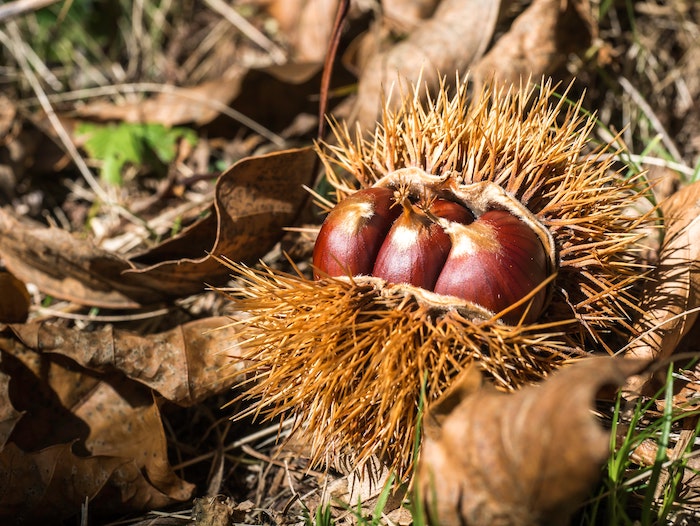Benefits of Chestnut for the Mind, Bones, Cardiovascular, and More

Chestnuts are a popular food item around the world. While they may be most commonly used in desserts and other sweet treats, there are many different ways to cook with and enjoy chestnuts.
And the benefits of eating chestnuts don't stop at taste – they offer several health benefits. In this article, we will explore how consuming chestnuts can help you live a healthier lifestyle. Discover all the nourishing powers of this traditional food source, from mental clarity to bone strength and cardiovascular health.
What is chestnut?
The chestnut is a deciduous tree native to North America, Europe, and Asia. The tree produces a nut that is encased in a hard shell. The nut has a sweet, rich flavor and can be eaten raw or roasted.
The chestnut tree is an excellent source of food for humans and animals. Nuts are a good source of protein, fat, carbohydrates, vitamins, and minerals. The trees are also used for timber and wood products.
The chestnut has many benefits for human health. The nut is a good source of antioxidants and helps to protect the body against free radicals. The nut also helps to improve cognitive function and memory. Additionally, the chestnut can help to prevent osteoporosis and reduce the risk of cardiovascular disease.
Nutritional value of chestnut
- Chestnuts are an excellent source of nutrition and offer many benefits for the mind, bones, cardiovascular system, and more. Here are some of the critical nutrients found in chestnuts and their potential uses:
- Vitamin C: Chestnuts are one of the richest sources of vitamin C, a powerful antioxidant that can help protect against cell damage. Vitamin C is also essential for Collagen production and vital for healthy skin, hair, and nails.
- B vitamins: Chestnuts are a good source of several B vitamins, including thiamin (B1), riboflavin (B2), niacin (B3), and pantothenic acid (B5). These essential nutrients play important roles in metabolism, energy production, nervous system function, and more.
- Vitamin A: Chestnuts contain small amounts of vitamin A, which is essential for vision health. Vitamin A is also an important antioxidant that can help protect cells from damage.
- Potassium is an electrolyte that helps maintain fluid balance in the body. It is also involved in muscle contraction and nerve function. Chestnuts are a good source of potassium and help keep your electrolyte levels balanced.
- Magnesium: Magnesium is involved in over 300 biochemical reactions in the body, including muscle contraction, energy production, and blood sugar regulation. Chestnuts are a good source of magnesium and help keep your metabolism running smoothly.
Health benefits of chestnut
There are many health benefits of chestnut. For one, they are suitable for the mind. They help improve cognitive function and memory. Additionally, they are ideal for the bones.
They help prevent osteoporosis and keep bones healthy. They are also suitable for the cardiovascular system. They help lower cholesterol and blood pressure. Lastly, they are ideal for the immune system. They help fight against infections and diseases.
How to include chestnut in your diet
There are many benefits to including chestnuts in your diet, and it is easy to do so. Here are some ways to have chestnuts in your diet:
- Add diced or pureed chestnut to soups or stews for extra flavor and nutrition.
- Make a chestnut-based pesto or sauce to top pasta or chicken dishes.
- Use chestnut flour when baking to add a unique flavor and nutritional value to your recipes.
- Enjoy roasted chestnuts as a healthy snack or dessert.
Recipes with chestnuts
Chestnuts are a unique and delicious ingredient that can be used in various recipes. They are packed with beneficial nutrients for the mind, bones, cardiovascular system, and more. Here are some recipes that feature chestnuts as a critical ingredient:
- Chestnut and Brussels Sprout Salad: This healthy salad is full of flavor and texture. The chestnuts add a nutty sweetness, while the Brussels sprouts provide a crunchy contrast.
- Roasted Chestnut Soup: This rich and creamy soup is perfect for a cold winter day. The roasted chestnuts give it a deep flavor that is sure to satisfy.
- Chestnut and Mushroom Risotto: This hearty dish is perfect for a special occasion. The chestnuts add sweetness, while the mushrooms provide an earthy depth of flavor.
Side effects of consuming chestnuts
While chestnuts are generally considered a healthy food, there are some potential side effects. Consuming large amounts of sayings can lead to stomach upset and diarrhea. Chestnuts also contain a compound called amygdalin, which can release cyanide when metabolized by the body.
Cyanide is highly toxic, so it's important not to eat too many chestnuts at once. Some people may also be allergic to chestnuts, so it's always best to test a small amount before consuming them in large quantities.
Conclusion
Chestnuts are incredibly nutritious, providing many benefits for the mind, bones, cardiovascular system, and more. They are rich in antioxidants and minerals such as zinc and magnesium and also contain high levels of vitamin B6 to help keep your immune system healthy.
With their versatility and long shelf life when properly stored, chestnuts can make a great addition to any diet. To maximize your nutritional powerhouse intake, try adding roasted or boiled chestnuts into salads or side dishes for added flavor and texture!
